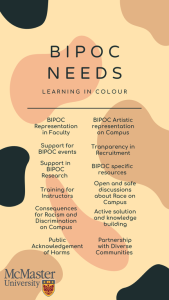23 What Can Be Changed?

We have posed some considerations that the academic institution should pursue to begin addressing some of the central issues related to Western epistemologies and their histories of colonialism and racism.
Themes
This Section has been organized into the following categories for recommendations to the institution:
- Pedagogical suggestions
- Administrative suggestions
- Student Service suggestions
- Hiring suggestions
- Physical/On-Campus suggestions

Pedagogical Suggestions
- Discussions of race, racism, and racialization should not be minimal, peripheral, and/or elective. Rather, race-related courses should be available and integral in each department and critical race lenses should be integrated into all courses. Each faculty and the potential professions that they seek to educate students for will interact with (and enact) race, racism, and racialization. These discussions are imperative for developing critical epistemologies and praxis, and they should be a part of every course that a student takes.
- Provide trainings, workshops, and supports for students to learn more about race, racism, and racialization. These should be led by racialized organizers and should not be structured in a way that upholds white fragility. Facilitators of these trainings and workshops should be compensated for their work.
- Provide ongoing trainings, workshops, educational opportunities, and supports to instructors, teaching assistants, and student-facing staff about creating safer spaces, challenging racism, and practicing anti-racism. These trainings should be mandatory and updated yearly to foster continuity and provide up-to-date information. Facilitators of these trainings and workshops should be compensated for their work.
- Financially compensate racialized students for the labour they undertake in (in)formal consultations about course creation and development with instructors, administrators, and staff. Create opportunities for them to take up these roles if they would like to do that work.
- Actively re-evaluate assignment and exam construction/composition and assessment practices from critical race, decolonial, and intersectional lenses. Instructors and faculties should be challenging the centrality of western epistemologies and how that stifles students’ lived experiences and ways of knowing/being/thinking/doing.
- Audit courses and course outlines to ensure that they are up-to-date and critically conscious about racism, race, and racialization. Course outlines could also include group guidelines and/or a statement about how the instructor is actively seeking to utilize anti-racist educational practices.
- Reconfigure course and teaching evaluation practices to ensure racialized students are given space to provide honest feedback about instruction, teaching, and learning. In a similar vein, these assessments should also consider racialized instructors’ experiences of teaching to ensure that they are being supported by the department.
- Integrate opportunities for students to become more actively engaged in anti-racist work happening in the broader Hamilton community. Fund guest speakers and community consultants from local organizations to support course/educational development.
Administrative Suggestions
- Provide accommodations and academic supports that specifically and intentionally recognize racialized students’ experiences, concerns, needs, and contributions. Our team is currently working on an advocacy initiative that pertains to these concerns, paired with emerging resources on campus (e.g. the Black Student Success Centre).
- Re-work existing administrative processes to be more accessible and cognizant of the barriers that prevent students from accessing supports, financial aid, etc. For example, reduce the administrative burden on students and/or offer them tangible support and resources to navigate these systems.
- Offer more financial aid and scholarships that are specifically available for racialized students.
- Scholarship applications that require personal statements or essays should not implicitly or explicitly demand that racialized students disclose things about their personal lives, lived experiences, or experiences of racism. Many students describe this as “trauma porn” that is re-traumatizing.
- Pursue initiatives and opportunities to respect, honour, and celebrate cultural holidays and observances. Fund cultural celebrations on campus to support students and their communities.
- Provide training and education to student-facing administrative staff about how they can better support students and create safer spaces.
- Fund racialized student-led EDI initiatives and provide opportunities for racialized students to get more involved in research projects and paid positions.
Student Service Suggestions
Dispute/complaint resolution
-
- These channels should limit the administrative burden on racialized students seeking redress for harm happening in the classroom or on campus and/or provide significant support about how to navigate these processes (e.g. related to filling out forms, contacting appropriate personnel).
- Information about these services should be made readily available; peer support services for racialized students should be trained and/or have fulsome information and materials to assist students in navigating the process and/or advocating on their behalf.
- Racialized students should not be expected to retell or repeat their stories to multiple parties. Those receiving disclosures and supporting the formal reporting process should do so from an anti-racist, critical, and trauma-informed lens, which they should be fully trained for.
- While conducting investigations and facilitating formal reporting procedures, the committees undertaking this work should have community representatives (e.g. those not paid by the university) to facilitate trust in the student and transparency about the process so students do not feel that their interests are being subjugated to protect the institution.
- Personnel should work collaboratively with the student to ensure they feel supported in completing their academic work (e.g. do they feel safe returning to the class? Do they require accommodation?).
- Resolutions should involve accountability on the part of the institution AND the instructor/peer/TA/administrator who perpetrated harm.
Equity and Inclusion Office (EIO)
-
- Like all services and organizations across campus, EIO must prioritize transparent processes related to dispute/complaint resolution and experiences of racism. Put simply, they must actively prioritize the student’s wellbeing over the institution’s reputation, which might be supported by community-based, third-party representatives involved in these processes.
- Paid consultation opportunities and internships should be made available for racialized students to recognize the significance of their labour.
- The university should fund the expansion of EIO and enact targeted hiring practices that seek the fulsome representation of various marginalized identities in a variety of positions related to student safety and anti-racism.
- Various supports and spaces within EIO should be designed, implemented, and funded specifically for racialized students and their communities.
- Student feedback should be actively sought and integrated into EIO’s operations and recommendations for faculties. This feedback should be collected by individuals that are not paid representatives from the university as it might decrease trust and transparency.
Student Wellness Centre (SWC)
-
- These supports for students should include racialized staff, such as counselors, public coordinators, and peer support representatives.
- Counselors and other SWC personnel should be trained and educated on anti-racist practices, and this training should be updated yearly.
- SWC counselors should work collaboratively with academic support staff to advocate for students (e.g. for extensions/accommodations, for other academic needs, etc.)
- Student supports should not partner with security and/or police services based on many racialized students’ distrust and fear of these organizations for the harm they have historically perpetrated. Ethical policies mandating security involvement when “risk” is identified should be re-worked to consider the reality that security is not safe for many racialized students.
Hiring Suggestions
- Continue hiring Black, Indigenous, and racialized faculty and staff in various departments, faculties, and spaces on campus. This should not end with the targeted hiring initiative from 2020.
- Hire racialized staff and faculty to deliver services and teach courses outside of only race, racism, and racialization. Do not silo or tokenize them.
- Create paid positions and internship opportunities specifically for racialized students in a variety of campus settings.
- Actively re-evaluate hiring practices to shift toward anti-racist considerations. (e.g. requirements to achieve tenure and their centralization of Eurocentric epistemologies and achievements)
- Health benefits via Unions should be liveable and cognizant of barriers for racialized folks seeking adequate healthcare.
- Implement departmental and faculty supports for new racialized staff and faculty hires that actively seek to redress historical exclusions and inequities within academia.
Physical/On-Campus Suggestions
- Create more spaces on campus that are for racialized students specifically (e.g. safer spaces for them to gather, study, build community, etc.).
- Take down “walls of white,” where only white faculty and administration are represented and celebrated.
- Commission racialized artists and/or pay for their artwork to hang up across campus to represent various cultures and identities.
- Divest from security services as primary emergency responders; create alternate emergency/crisis response teams comprised of those not affiliated with security or police to cultivate safety for racialized students who fear or distrust security and police.
- Broaden understandings of accessibility to account for the ways in which disability, access, mobility, and inclusion intersect with race, racism, and racialization (e.g. how can spaces on campus feel accessible for racialized students?)
